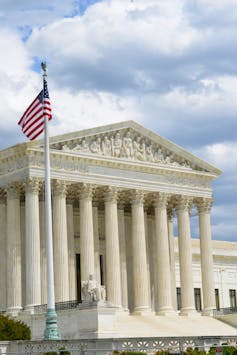Trump has threatened to fire the chair of the US Federal Reserve. That could be bad news for inflation
- Written by Henry Maher, Lecturer in Politics, Department of Government and International Relations, University of Sydney

US President-elect Donald Trump has repeatedly threatened to fire the chair of the US Federal Reserve, Jerome Powell.
Up until this week, that may have seemed like a distant and outlandish prospect. Now, we again have to take it seriously.
Powell himself certainly is – and has already begun pushing back on the front foot. Responding to the threat on Thursday, he insisted[1] he will not resign. Further, he said any attempt by Trump to remove him was “not permitted under the law”.
Whether Trump actually attempts to follow through on his threat will provide an early litmus test of any potential authoritarian tendencies.
Powell’s dismissal would breach long-standing norms of central bank independence[2]. If successful, such a move could have a serious impact on democracy and the separation of powers, with consequences around the world.
Read more: Trump has vowed to be a 'dictator' on day one. With this day now coming, what exactly will he do?[3]
An old quarrel
The feud between Trump and Powell is nothing new. Trump himself actually appointed Powell to the Federal Reserve governorship back in 2018. However, like many of his other appointees, Trump soon turned against Powell.
Criticising[4] the Federal Reserve for not cutting interest rates quickly enough in 2019, Trump called Fed officials “boneheads”, accusing Powell of having “No ‘guts’, no sense, no vision!”
Beyond Trump, many economists have praised[5] Powell’s management of monetary policy, which has successfully reduced spiralling inflation rates. President Joe Biden was sufficiently convinced to appoint Powell to a second four-year term as chair which began in 2022.
Trump, though, only stepped up his criticisms, many of which became inconsistent with his earlier position. In February this year, he was suddenly blasting[6] Powell for even contemplating interest rate cuts.
Trump claimed baselessly that it was a political move by Powell – a lifelong Republican – to help Democrats win the presidential election.
Could Trump actually fire Powell?
Trump has repeatedly[8] claimed he has the power to fire Powell, and that as president[9] he should have influence over the setting of interest rates.
The relevant legislation[10] holds that a member of the Federal Reserve board may be “removed for cause by the president”. But in this context, courts have interpreted “for cause” to refer to misconduct or impropriety. The president cannot remove the members of the board purely for policy or political reasons.
However, Trump could attempt to demote Powell from chair to an ordinary member of the Federal Reserve, and put another candidate in charge. Here, there is less of a legal precedent. Previous presidents have always assumed they did not have the power to do this.
The closest historical precedent[12] lies in an attempt by President Franklin Delano Roosevelt to fire the commissioner of the Federal Trade Commission in 1933. Here, the courts ultimately found in favour of the commissioner’s independence.
But the legal landscape has changed. It is possible that a Supreme Court sympathetic to Trump – which has previously found[13] in favour of expanded executive presidential power – might reach different conclusions.
Inflation, inflation, inflation
If Trump does attempt to remove Powell, it will radically affect the independence of the Federal Reserve. That could seriously impact its ability to set interest rates free from direct political interference.
This would likely increase inflation in the long run. If markets believe politicians are likely to interfere in the setting of interest rates to favour their own short-term political interests, investors will expect lower interest rates in the future.
This expectation alone is sufficient to cause inflation, and a major reason[14] why most developed countries now insulate their central banks from direct political control.
Ironically, promising to reduce inflation was a central plank of Trump’s successful election campaign. How Trump approaches Powell’s future will therefore be closely watched by markets.
Checks and balances
Trump’s view that the president should have power over both independent government agencies and interest rates reflects his widely noted “populist[15]” approach to politics.
Populist politicians claim to embody the popular democratic will. Accordingly, they often oppose institutional checks and balances on their powers, viewing them as impediments to the democratic mandate they claim to represent.
The US political system has historically had a lot of checks and balances[17]. The idea is to limit the amount of power any one politician or party can accrue.
The “separation of powers[18]” – a cherished principle in the United States and beyond – seeks to spread power out across different institutions such as the judiciary, the legislature, the presidency and other independent institutions.
If Trump fires Powell, it will provide a strong indicator of how a second Trump presidency will approach the separation of powers, and suggest concerns about Trump’s future authoritarian intentions are justified.
Read more: With Trump returning to the White House, what will happen to his court cases?[19]
References
- ^ insisted (www.cbsnews.com)
- ^ central bank independence (www.imf.org)
- ^ Trump has vowed to be a 'dictator' on day one. With this day now coming, what exactly will he do? (theconversation.com)
- ^ Criticising (www.theguardian.com)
- ^ praised (www.economist.com)
- ^ blasting (thehill.com)
- ^ Susan Walsh/AP (photos.aap.com.au)
- ^ repeatedly (apnews.com)
- ^ president (fortune.com)
- ^ relevant legislation (www.law.cornell.edu)
- ^ CJ Gunther/EPA (photos.aap.com.au)
- ^ precedent (www.law.cornell.edu)
- ^ found (www.supremecourt.gov)
- ^ major reason (theconversation.com)
- ^ populist (theconversation.com)
- ^ Orhan Cam/Shutterstock (www.shutterstock.com)
- ^ checks and balances (www.usa.gov)
- ^ separation of powers (www.ruleoflaw.org.au)
- ^ With Trump returning to the White House, what will happen to his court cases? (theconversation.com)
Authors: Henry Maher, Lecturer in Politics, Department of Government and International Relations, University of Sydney







